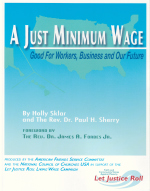Living Wage Events Link MLK Dream to Ending Poverty Wages
Washington, DC, The leaders of 15 denominations and national faith organizations are among the inaugural signers of Let Justice Roll’s letter in support of a $10 federal minimum wage in 2010. Four hundred faith leaders from all 50 states have endorsed $10 in 2010 and more are signing on every day.
Rev. Dr. Sharon E. Watkins, General Minister and President of the Christian Church (Disciples of Christ), signed the letter in support of $10 in 2010, saying, “National wage policies are moral documents that express the values of our country. A minimum wage closer to a living wage better reflects our values.”
Let Justice Roll, a national faith-community coalition, will hold Living Wage events on the Martin Luther King holiday weekend and later in January as part of the “$10 in 2010” campaign and in support of state and local living wage campaigns.
“Well before the recession, growing numbers of employed men and women sought help at food banks and homeless shelters because they could not live on poverty wages,” said Rev. Steve Copley, chair of Let Justice Roll. When the federal minimum wage increased to $6.55 last July, it still left workers with less buying power than they had in 1997, at the start of the longest period without a raise since the minimum wage was enacted in1938.
“Our economy would not be in such a mess if wages had not fallen so far behind the cost of living and income inequality had not grown to levels last seen on the eve of the Great Depression,” said Holly Sklar, senior policy adviser for Let Justice Roll and co-author of A Just Minimum Wage: Good for Workers, Business and Our Future. “As we are seeing so painfully, an economy fueled by rising debt rather than rising wages is a house of cards.”
It would take about $10 to match the buying power of the 1968 minimum wage. “It is immoral that the minimum wage is worth less now than in 1968, the year Dr. Martin Luther King was killed while fighting for living wages for sanitation workers,” said Rev. Copley. “It’s also bad for the economy. Minimum wage dollars go right back to local business through spending on food, healthcare and other necessities.”
Most of the 27 states with minimum wages higher than the federal level have unemployment rates that are lower than the federal level.
Congregations and organizations in states such as Tennessee, Georgia, New Hampshire, New Jersey, Illinois, Ohio, Pennsylvania, Massachusetts, California, Oregon, Colorado and Oklahoma will hold Living Wage services and events this month. For example:
● In Nashville, TN, Christian, Jewish, Muslim and Unitarian services will be part of a campaign for a citywide living wage ordinance, and the interfaith coalition will march in the annual Martin Luther King Day parade with signs that say “Living Wage Was Part of His Dream” and “Let Justice Roll.”
● In Nashua, NH, the president of the Unitarian Universalist Association, Rev. William G. Sinkford, will preach at a Living Wage service.
Let Justice Roll is also currently organizing to raise state and local minimum wages in Georgia, Tennessee, New Jersey and Kansas. Recently, Let Justice Roll helped workers in Kansas City, KS, more than double their pay from the lowest-in-the-US state minimum of $2.65 an hour. And Let Justice Roll is looking ahead to new campaigns in the South, where so many workers suffer the hardship of poverty wages.
Most of the ten occupations projected by the Bureau of Labor Statistics to have the largest employment growth during 2006-2016, such as retail salespersons, fast food workers, home health aides and janitors, have disproportionate numbers of minimum wage workers.
“A job should keep you out of poverty, not keep you in it,” said Holly Sklar. “The minimum wage sets the wage floor, and we cannot build a strong economy on downwardly mobile wages and rising poverty, inequality and insecurity. As President Roosevelt understood, we have to raise the floor to lift the economy.”
Inaugural “$10 in 2010” faith leader signers include:
Rev. Steve Copley, Chair of the Board, Let Justice Roll
Rev. Dr. Sharon E. Watkins, General Minister and President, Christian
Church (Disciples of Christ) in US & Canada
The Most Rev. Katharine Jefferts Schori, Presiding Bishop and Primate of The Episcopal Church
Bishop Gregory Vaughn Palmer, President, United Methodist Council of Bishops
Rev. Gradye Parsons, Stated Clerk of the General Assembly, Presbyterian Church (U.S.A.)
Rev. William G. Sinkford, President, Unitarian Universalist Association
Rev. John H. Thomas, General Minister and President, United Church of Christ
Rev. Dr. Michael Kinnamon, General Secretary, National Council of Churches USA
Mary Ellen McNish, General Secretary, American Friends Service Committee
Sister Simone Campbell, Exec. Director, NETWORK: A National Catholic Social Justice Lobby
Rev. Alexander Sharp, Exec. Director, Protestants for the Common Good
Rabbi David Saperstein, Director, Religious Action Center of Reform Judaism
Charlie Clements, President and CEO, Unitarian Universalist Service Committee
James Winkler, General Secretary, United Methodist Church General Board of Church & Society
Kim Bobo, Exec. Director, Interfaith Worker Justice.
For the full text of the $10 in 2010 letter, as well as information on signing, please visit http://www.letjusticeroll.org/faithletter.html or call Rev. Steve Copley at 501-626-9220.
New and updated Let Justice Roll resources include:
● Raising the Minimum Wage in Hard Times
● Policy Points: Raise the Minimum Wage to $10 in 2010
● Chart of states and cities with minimum wages above the federal level
● Resources for Living Wage Services & Community Events toolkit
With over 90 member organizations, the nonpartisan Let Justice Roll Living Wage Campaign is the leading faith, community, labor, business coalition committed to raising the minimum wage to a living wage at the state and federal level.





